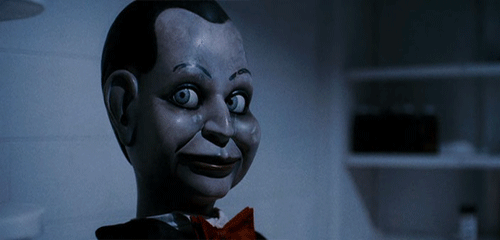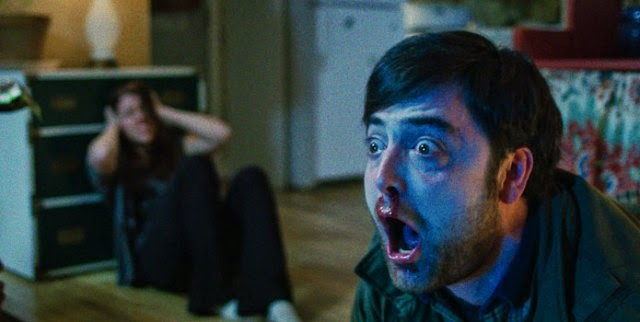 |
| "Terror has evolved." |
Blood Glacier isn't exactly a flawless movie, but it was certainly earnest in its attempt to be both topical and different. An Austrian film, I caught it on NetFlix last night and watched it in two sittings. One of the issues I had going in was that the movie was dubbed in English and there wasn't a German-language version that I could watch instead. Despite this, I decided to stick with the film.
The movie begins with the simple idea that global warming is real, it's worse than we imagined, and all the antarctic ice would have melted within 10 years (of 2014), irreparably changing the world and the people and animals that live there.
A team of researchers and their technician, Janek (
Gerhard Liebmann), are manning a small post in the Austrian Alps where they monitor the climate, collect rocks, drill for ice samples, and the like. The researchers--Birte (
Hille Beseler), Falk (
Peter Knaack), and Harald (
Felix Romer)--seem to be, respectively, a biologist, a mineralogist, and a... well, I'm not quite sure what Harald's specialty was. Janek is a bit eccentric, and has lived at the post for going on five years along with his dog, Tinnie (
Santos). The researchers don't seem to care for him too much, as he's a loner and is pretty rough around the edges. They tolerate him, though, since he's so familiar with the surrounding area and can keep the place running.
Janec, Tinnie, and Falk hike out to a nearby glacier to collect rocks. When they arrive, they find the glacier dripping with a red fluid, very much the color of blood (very much like
this, only bigger). Neither has seen anything like this before, and Falk gets to work collecting some samples while Janec busies himself in a small research shack/shed. Tinnie disappears into a cave beneath the glacier and encounters a very sick fox. Something emerges from the fox and injures Tinnie. Seeing the remains of the fox, Janec assumes it was rabid and had attacked his dog.
 |
| At least they didn't have to dub the dog's dialogue. |
After dressing Tinnie's wound, they return to the outpost and Birte starts to go over the samples Falk collected from the glacier. She's unable to classify the single-celled organisms in the sample, but she seems to have plenty of theories. After passing out outside, Janec awakes and hears something in the garbage near his shack. He investigates and discovers a nasty creature--seemingly part bug, part fox--which gets away as he runs for the shelter of the research shack. He figures it must've been the same rabid fox that hurt Tinnie.
To add a twist to the proceedings, a government official, Ministerin Bodicek (
Brigitte Kren), is scheduled to visit the outpost, mostly as a PR move. The researchers are keen to make a good impression on her, likely because they want to maintain funding for the project. Given the critters running around, Janec thinks having an important visitor stop by is a really bad decision. Of course, no one listens to him.
As the researchers start to get a better idea of what they're dealing with--a microorganism that causes host animals to mutate--Janec's negative feelings on the matter of the visit intensify. Unfortunately, the researchers are dead set on having the minister show up. Not only that, but they intend to hide evidence of their discovery until they can learn more about it.
 |
| Yes, dear reader. That's a giant pill bug. And it's mean. |
Along with Ministerin Bodicek is a small retinue, including Bert Krakauer (
Wolfgang Pampel, who I assumed was her husband or significant other), her bodyguard, Luka (
Murathan Muslu), as well as a photographer, Urs (
Michael Fuith) and his banana-eating assistant (or main squeeze), Irene (
Adina Vetter). Accompanying the minister and her retinue as a guide is Tanja (
Edita Malovcic), who turns out to be Janec's ex-girlfriend. By the time Bodicek and what's left of her retinue make it to the outpost, all hell has broken loose.
I didn't predict the little twist at the end of the film. I expected something similar to happen, but not in the same way that it actually took place. Given the metaphysics of the movie, it made perfect sense once the pieces came together.
The special effects--especially the majority of the creature effects--are laughable. I caught myself cackling whenever a new mutated critter was introduced into the mix. That said, I think pretty much every mutated beast was created with practical effects, which I have a real soft spot for. I'm pretty sure stop-motion was used in a few scenes, too, which in and of itself is unusual in this day and age. There may have been some CGI, but it's not nearly as obvious or common as it is in most of today's genre films.
 |
| Tanja and Janec, star-crossed lovers. |
The acting might have been bad, or it might have been good. I can't really make a decision about the acting, except to say that the voice actors who dubbed the English lines were pretty horrible. The actual actors seemed to hold character well, but without a voice to go with the physical performances, I can't really say for sure if they were good or bad.
The cinematography was okay. There are some really impressive (and beautiful) panoramic shots in the film, but a lot of the close-up work, while effective, seemed pretty amateurish. The score that went along with the movie was mostly subdued, but occasionally veered off into a sort of exaggerated overdrive. One thing I did enjoy was the opening credit sequence, which is part of the reason I stuck with the movie in the first place.
Was
Blood Glacier scary? Well... let me be honest. Once I saw the critters on the screen, any sense of nervousness I might have had went out the window. Some of the make-up effects were gross, sure, but gross things don't generally scare me. In some respects, it was like watching Peter Jackson's
Dead Alive (aka,
Brain Dead). How can anyone be scared of that sort of stuff? That said, there are still a few tense moments, and I felt genuine sympathy for Janec and his dog on a couple of occasions.
 |
| This is one mosquito you probably want to avoid. |
Did I enjoy
Blood Glacier? Yes, in spite of myself and against my better judgment, I did. I have to put this movie in the same category as
Frankenstein's Army--it's enjoyable (if you can get past the horrible dubbing), but most of the scares are either quick shocks or gross-outs. It was obviously influenced by John Carpenter's
The Thing, but it misses the mark a little bit. If you're looking for a popcorn movie that doesn't seem to take itself too seriously and don't care if the monsters look like something out of a kid's home movie, you should check it out.
I'd like to watch this movie in the original German with subtitles just to see if all the translations were accurate or representative of what was going on. I'm not sure if that will happen, but if it does I'll have to update this review.



























